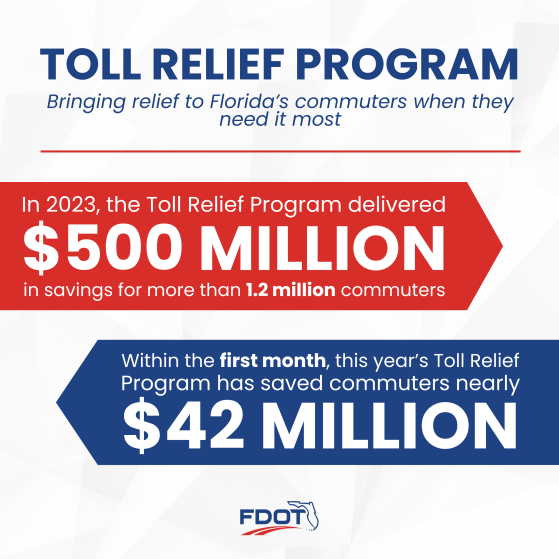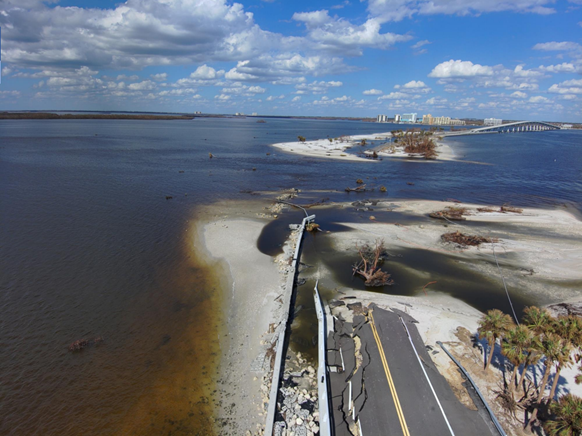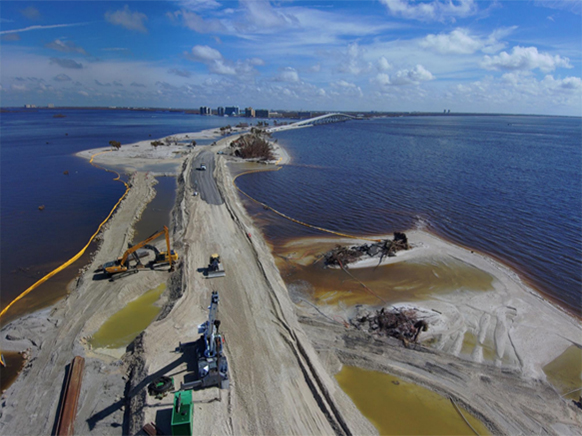Infrastructure over Ideology
Florida boasts the 14th largest economy in the world and fortunately has the means necessary to fight back against the continued weaponization of Biden’s transportation department. For context, only 25 percent of Florida’s transportation budget comes from the federal government, and the state is not slowing down on that commitment, with a planned $64 billion in infrastructure improvements through 2030.
This is because Florida recognizes that every dollar invested in infrastructure results in up to a $4 return to Florida residents and businesses. But that return is a result of moving people and goods quicker, rather than advancing a sociopolitical agenda.
Due to unfortunate Congressional gridlock, blocking these damaging mandates through legislation is not a viable solution. The State of Florida must therefore explore alternative avenues to fight back, and the courts are our best bet. Considering Florida’s legal victory against the Administration regarding its illegal greenhouse gas performance measure, FDOT is emboldened to challenge the legality of several executive rulemakings, including NEPA Phase 2, PEF, Light & Medium-Duty emissions, and Heavy-Duty Emissions.
The State of Florida has now filed 50 lawsuits in total against the Biden Administration. Rest assured, FDOT will not sit idly as this White House unilaterally enacts policies which restrict your freedoms as well as your ability to provide for yourselves and your families. Florida stands ready to identify and legally contest unconstitutional mandates which threaten the way of life for its over 22 million residents.
Florida Provides Congestion Relief Decades Ahead of Schedule
During the 2023 Legislative Session, Governor DeSantis proposed, and the Florida Legislature then passed the Moving Florida Forward Infrastructure Initiative. As part of the effort FDOT identified a selection of critical needs on state-owned roadways with broad community support that only lacked funding to begin construction. During the 2023 and 2024 legislative sessions, FDOT received all funding authority necessary to deliver on these projects to reduce congestion and enhance Florida's economic competitiveness. Notably, these projects have no federal aid dollars and are supported by state financial resources.
In April 2024, Governor DeSantis announced that congestion relief projects to widen major sections of the heavily traveled Interstate-4 corridor would be delivered up to 15 years sooner than originally scheduled.

Governor DeSantis Secures Nearly $1B in Toll Relief for Florida Families
In April, Governor DeSantis announced a second consecutive year of the highly successful Toll Relief Program, which will cut the toll rates of frequent commuters in half by applying a toll credit from April 2024 to March 2025. Launched last year, drivers utilizing Florida-based toll transponders (including SunPass and other Florida-based transponders) and having 35 or more qualifying toll transactions monthly will receive a 50 percent credit to their account. A map of toll facilities included in this year's program can be found here.
In 2023, the Toll Relief Program delivered $500 million in substantial savings to over 1.2 million commuters, equating to an approximate savings of $400 per individual.
In June 2024 alone, 1.2 million SunPass customers saved nearly $42 million.

Florida Leads on Advanced Air Mobility
While Washington continues to delay anything that hurts their narrative of “the bus or bust” Florida continues to lead the nation in advancing transportation innovations, including through Autonomous Vehicles and Advanced Air Mobility (AAM). In October, Secretary Perdue called on USDOT Secretary Buttigieg to end the FAA delay on advancing this important work noting, “ As our global competitors continue to prioritize the enhancement of their air transportation systems and surpass the United States in the use of AAM, I implore you to act with a heightened sense of urgency on the finalization of these guidelines. For a country with an established record of leading in the aerospace sector, your Agency's lack of initiative seeks to damage it and is detrimental to the growth of an industry that can truly revolutionize our nation's transportation options.”
In June 2024, FDOT completed its final AAM tabletop exercise, reinforcing the state’s leadership in bringing transportation innovation to communities throughout Florida.
Around The Clock Work to Reconnect Communities After Category-Five Hurricane
Year after year, FDOT solidifies its commitment to Florida communities with immediate emergency response and recovery efforts. Noteworthy examples include the swift action taken after Hurricane Ian caused major devastation in Southwest Florida in 2022.


Pine Island and Sanibel Island sustained damage to their bridges and roads, preventing drivable access to and from the barrier islands. Despite the Pine Island Bridge being locally owned, FDOT stepped in to assist with recovery and access efforts. Hundreds of loads of sand and rock, heavy equipment, and FDOT crews worked alongside partners day and night to literally pave the way to reconnect the island to the mainland. These efforts quickly restored access to the stranded communities, with temporary bridge repairs being completed in less than three days.
Emergency repairs to the Sanibel Causeway were also prioritized in response to Hurricane Ian, as the locally owned roadway and the very land that the road was built on was washed away by the catastrophic storm. FDOT, alongside industry and local partners, were able to expedite repairs enough to allow a one-time convoy of utility restoration equipment and teams to advance assistance for residents on the island. Temporary repairs of the causeway were completed and opened to the public in just 15 days, more than a week ahead of schedule.

